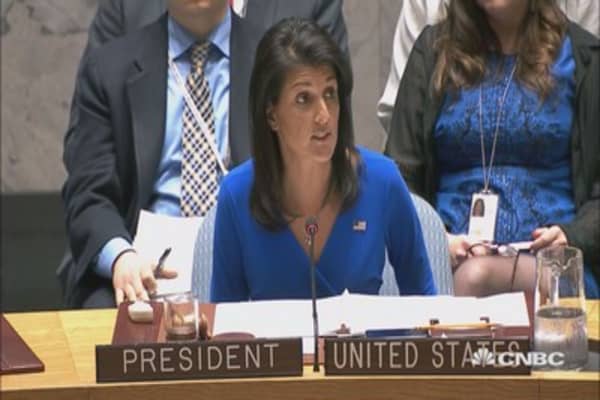U.S. Ambassador to the United Nations Nikki Haley threatened the pull-out last year, citing longstanding U.S. complaints that the 47-member council is biased against Israel.
But Tuesday's announcement also comes just a day after the U.N. human rights chief denounced the Trump administration for separating migrant children from their parents.
It also extends a broader Trump administration pattern of stepping back from international agreements and forums under the president's "America First" policy.
Published 8 Hours Ago Updated 4 Hours Ago The Associated Press
United States ambassador to the United Nations Nikki Haley addresses the U.N. Security Council, December 8, 2017.
Secretary of State Mike Pompeo and U.S. Ambassador to the United Nations Nikki Haley delivered the verdict on the U.N. Human Rights Council in a joint appearance at the State Department.
"For too long, the human rights council has been a protector of human rights abusers and a cesspool of political bias," Haley said in announcing the withdrawal. "Regrettably, it is now clear that our call for reform was not heeded."
Haley threatened the pull-out last year, citing longstanding U.S. complaints that the 47-member council is biased against Israel. But Tuesday's announcement also comes just a day after the U.N. human rights chief denounced the Trump administration for separating migrant children from their parents.
It also extends a broader Trump administration pattern of stepping back from international agreements and forums under the president's "America First" policy.
Since taking office, the administration has announced its withdrawal from the Paris climate accord, the U.N. educational and cultural organization and the Iran nuclear deal. Other contentious moves have included slapping tariffs on steel and aluminum against key trading partners, recognizing Jerusalem as Israel's capital and moving the U.S. Embassy to the holy city from Tel Aviv.
Haley has been the driving force behind the move, which would be unprecedented in the 12-year history of the council. No country has ever dropped out voluntarily. Libya was kicked out seven years ago.
The move could reinforce the perception that the Trump administration is seeking to advance Israel's agenda on the world stage, just as it prepares to unveil its long-awaited peace plan despite Palestinian outrage over the embassy relocation. Trump's son-in-law and senior adviser, Jared Kushner, is visiting the Middle East this week as the White House works to lay the groundwork for unveiling the plan.
Last year, Haley warned the Geneva-based council that the U.S. would withdraw if it did not end its systematic scrutiny of Israel and its alleged rights abuses against Palestinians.
She denounced the council as a "forum for politics, hypocrisy and evasion" and accused member countries such as Venezuela, Cuba, China, Burundi and Saudi Arabia of failing to fulfill their duties to "uphold the highest standards" of human rights, while emphasizing what she said was the council's anti-Israel bias.
Since last year, Haley's office has also pushed the council and its chief not to publish a U.N. database of companies operating in West Bank settlements, a so-called blacklist that Israel is concerned could drive companies away and cast a further pall over its presence in the Palestinian-claimed West Bank.
Israel is the only country in the world whose rights record comes up for discussion at every council session, under "Item 7" on the agenda.
The officials said the administration had concluded that its efforts to promote reform on the council had failed and that withdrawal was the only step it could take to demonstrate its seriousness. It was not immediately clear if the U.S. would remain a non-voting observer on the council.
The U.S. pullout leaves the council without one of its traditional defenders of human rights. In recent months, the United States has participated in attempts to pinpoint rights violations in places like South Sudan, Congo and Cambodia.
There are 47 countries in the Human Rights Council, elected by the U.N.'s General Assembly with a specific number of seats allocated for each region of the globe. Members serve for three-year terms and can only serve two terms in a row.
The United States has opted to stay out of the Human Rights Council before: the administration of President George W. Bush did so when the council was created in 2006. Item 7 on "Israel and the Occupied Palestinian Territories" has been part of the council's regular business almost as long as it has existed.
The pullout could be largely symbolic: The United States' current term on the council ends next year, when it could revert to the observer status held by other countries that are not members. In that situation, the U.S. would be able to speak out on rights abuses, but not to vote.
The State Department's web site says protection of fundamental human rights was a "foundation stone" for the United States' creation over two centuries ago and that promoting respect for human rights since has been a "central goal" of U.S. foreign policy.
Source


No comments:
Post a Comment